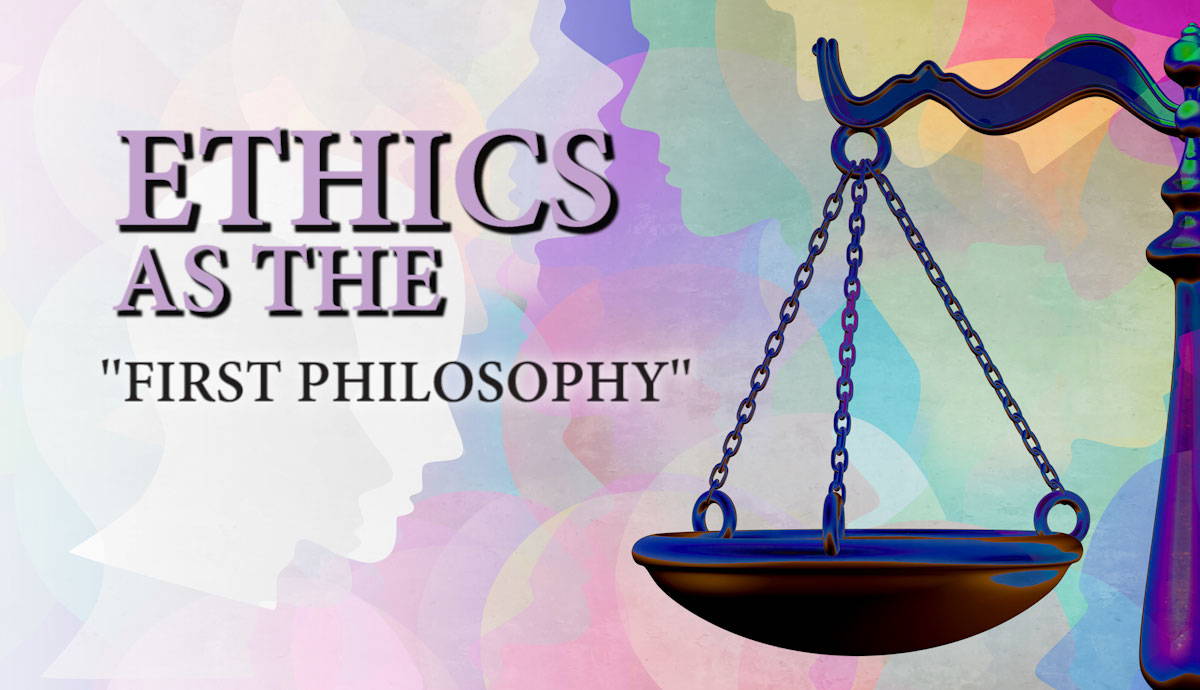
Emmanuel Levinas is, in one sense, an ethical philosopher, but he rejects the entire theoretical framework of existing moral philosophy, and at times seems to close off the possibility of doing philosophy altogether. The ethics that interests Levinas are the ethics that come into play just by being alive in the world: the experience of encountering another person, face to face, and realizing that they are another person, separated from the self by an unbridgeable gulf of understanding. For Levinas, this ethics is the bedrock of philosophy; it characterizes both the traumatic encounter that incites philosophy and the possibility of escape from that trauma. As such, Levinas declares that ethics, rather than metaphysics, is the “first philosophy.”
Aristotle and First Philosophy

Aristotle identifies metaphysics as “the study of being qua being,” as the “first philosophy,” but it’s a claim that invites some basic definitional questions. What Emmanuel Levinas is overturning in asserting ethics as the first philosophy is one of the foundational assumptions of almost all western philosophy: the priority of being to thought. Aristotle wants to situate being as the most basic stratum of philosophy, the fundamental level on which all other subjects of thought are built. One important corollary of this is that the philosophy which discusses what is and where it is, and what the parameters of being in the world are, becomes the most important kind of philosophy. Metaphysical questions are treated as the most general and consequential ones that thought can address.
Crucially, Aristotle does not just prescribe a subject matter but a method of investigation: being is to be studied qua being. Metaphysics, then, as both method and subject matter, is the domain of philosophy on top of which everything else sits. First philosophy is about how beings and matter are caused, how they behave, and what principles govern their existence and interrelation. If there is anything else that can claim to be first philosophy, for Aristotle, it is theology, or the study of eternal and non-physical things. Everything else that we can study or think about is conceptually dependent on first philosophy.

Though it is hardly straightforward to say what it means for one philosophical discipline to sit on top of another one, or to be less fundamental than it, we can pick out two important implications. First, if there is a hierarchy of priority and metaphysics is at the top, we can expect philosophy to see its project and its practical energies as being guided and directed by that most important study: the duty of the philosopher is then first and foremost to find and explain truths about being and beings.
Second, if other philosophical disciplines sit atop metaphysics, and are subordinate to it, we can expect the conclusions of metaphysics, changes to prevailing thought about it, and arguments that concern its questions, to flow directly down to all other philosophical disciplines and questions. If, in short, metaphysics is first philosophy, then it is the work of philosophers interested in all other kinds of philosophical questions to reconcile their thought with the truths and principles of being, and not the other way around.
In trying to establish ethics as the first philosophy, Levinas wants to invert precisely this formula, and make metaphysics subordinate and secondary to ethics and to questions of how we should act. The primary duties we have, philosophers and everyone else alike, are ethical ones: duties to act in certain ways, according to our responsibilities to others, and not to seek out fundamental truths about being.
René Descartes and the Ego

The other target Levinas doubtless has in mind with his surprising claim that ethics is the first philosophy is Descartes, who appears again and again in Levinas as a metaphorical punching bag. If there is one thing Levinas is writing against, it is the Cartesian idea of subjecthood: the floating, disembodied ego of the cogito without past or future, senses, or interlocutors.
Descartes’ Meditations on First Philosophy (1641) go further than Aristotle in construing the foundations of philosophy as totally insulated from the conditions of life. Metaphysics is isolated as a theoretical exercise that treats the body and other humans alike as dubitable; they are framed as things that can and should be stripped away from the proper activity of philosophy.
Levinas retorts that we not only should not strip away the conditions of life that we encounter as always already present when we do philosophy, that we cannot. Cartesian first philosophy relies on a wishful delusion of the subject, an ‘I’ who is totally untethered from any self. Doing philosophy with this kind of subject in mind is redundant, insofar as it is a delusional hypothetical, one that attempts to avoid the fundamental task that is philosophy’s duty: escaping this tragic anchoring of the ‘I’ to the self.
Worse still, Descartes abstracts out of the picture the very experience that, for Levinas, is the foundation of philosophy, and which necessarily precedes all theoretical activity of the kind the Meditations pose as the first philosophy. That we should not found philosophy on the Cartesian ego is not just a matter of getting things right, it is a properly ethical question of whether we should approach things in this way. To indulge the fantasy of a disembodied subject, who doesn’t have to take seriously any Others they encounter, is to shirk our responsibilities to those others, which are unfathomably vast.
Levinas’s Ethics as Antiphilosophy

There is an antiphilosophical component to Levinas’s conception of first philosophy, since for Levinas the foundational ethical experience is wholly pre-theoretical – an immediate, overwhelming responsibility that imposes itself upon us long before we can begin to think philosophically about it.
Ethics is first philosophy, but ethics is not – at first – philosophy at all; it is a kind of sensibility or pre-theoretical intuition. Levinas sometimes seems to be saying that we should substitute the immediate, infinite, pre-theoretical ethics of the face-to-face encounter for conventional philosophical ethics, and it is this substitution that threatens to leave ethics not as the foundation of ethics, but as its total blockage.
In its antiphilosophical capacity, Levinas’s ethics opposes itself to any theoretical or “founded” ethics. Indeed, Levinas’s ethics opposes itself to any theoretical or philosophical explanation of the foundation of ethics, be it in terms of virtue, utility, or specific duties. For Levinas, philosophy and argumentation are in no way involved in getting from experience to the ethical. Rather, experience is immediately and already ethical in character, and philosophy – his philosophy – works from that ethical experience towards the total repudiation of metaphysics: the escape from being.
Politics and Pragmatics: Why Does it Matter that Ethics is First Philosophy?

The claim that ethics is the first philosophy at first seems like a mere statement of intention for Levinas’s philosophy, an indication that being will take a backseat to obligations. It is, on one view, hard to find in this claim any substantive content. However, given the kind of ethical experience Levinas focuses on, and its living, pre-theoretical opposition to any more detached kind of philosophy, the claim that ethics – so construed – comes before metaphysics takes on a stronger sense.
Recognizing that we start with the otherness of the stranger, and we head towards the otherness of ourselves – towards the escape from being and facticity – is not merely to establish an arbitrary priority. Ethics being cast as first philosophy recasts metaphysics as s study to be circumvented, as something that philosophy should not aim towards but avoid.
Framing ethics as first philosophy also makes a difference in the philosopher’s behavior. If we take Levinas’s description of our obligation to the Other seriously, even in the absence of a specific set of ethical norms, our lives begin to look radically different. Since there is nothing that needs to get out of the way before we can be certain about our ethical responsibilities, and since there is nothing more basic than ethics that might shift or upturn our whole ethical conception, there is no reason for theoretical concerns or uncertainty to get in the ways of an ethical life which is utterly, even infinitely, selfless.

The Aristotelian belief in the primacy of metaphysics has, for Levinas, a distinctive ethical character, not only insofar as it gets placed downstream of ethics as a discipline, but also insofar as it is a kind of egoism that the Other orders us not to indulge in. The belief that metaphysics is the most basic stratum of thought coincides with a kind of entrapment in the self, in the belief that the world exists for me and me alone, in which I am free to act according to subjective will, free from my ethical duties towards the Other. This egoism has a particular philosophical character, and Levinas’s critique of it is a critique of the Cartesian subject, but it is also a straightforward ethical and political critique of our prevailing mode of thought.
If philosophy at large is nested atop ethics, and we all have a pre-theoretical ethics of feeling infinitely obliged to people we encounter, the philosopher cannot be justified in their constant skirting of ethical responsibilities due to higher concerns; for Levinas, there simply are none. Levinas traces the line from his critique of Descartes to a critique of contemporary western liberalism, but his ethics has more expansive demands upon us. The escape from being involves going back into an ethics that precedes the ego, by giving up all the attachments that, for Descartes, are absolutely fundamental to thought. The reward for this is that we get to escape ourselves, but it appears that in doing so, anything recognizable as philosophy must be renounced.










